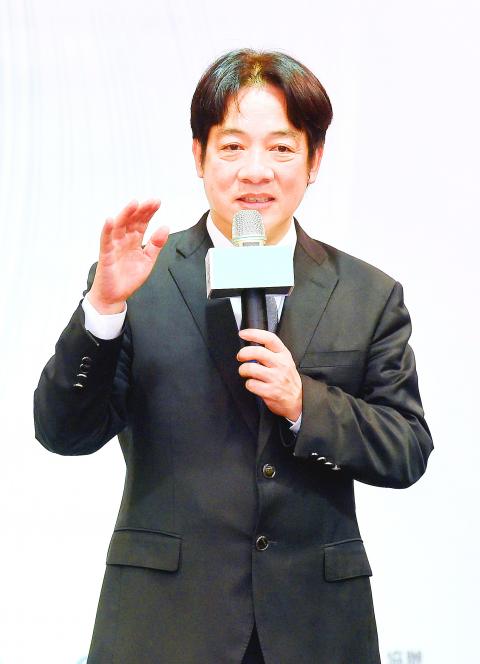As criticism from pro-Taiwan independence groups over the Democratic Progressive Party (DPP) government’s handling of a referendum on the national team’s name at the 2020 Tokyo Summer Olympics mounts in cyberspace, Premier William Lai (賴清德) yesterday defended his commitment to a pragmatic approach to Taiwanese independence.
An alliance of civic groups has initiated a referendum drive on renaming the national sports team from “Chinese Taipei” to “Taiwan” at the Tokyo Olympics and other competitions.
The DPP government’s perceived lack of support for the referendum has prompted charges that Lai is foxi (佛系) about Taiwanese independence, a Chinese Internet slang term referring to Buddha-like passivity and indifference toward a goal.

Photo: Chu Pei-hsiung, Taipei Times
Quoting Lai’s description of himself as a “political worker for Taiwanese independence” when he fielded questions from lawmakers at the Legislative Yuan in September last year, a group of pro-localization organizations last month called for Lai to lend his support to the proposed referendum.
In an interview yesterday with Web-based Yahoo TV, Lai said that Taiwanese independence through pragmatism is derived from and defined by the DPP’s “Resolution on Taiwan’s Future” ratified in 1999.
The resolution states that Taiwan is a sovereign and independent nation named the Republic of China (ROC) that is neither a subordinate of China, nor seeks to subjugate China, whose future can only be determined by the will of its people, he said.
There is nothing wrong with advocacy for renaming the nation’s Olympic team to “Taiwan,” Lai said, adding that proposal organizer Chi Cheng (紀政) competed under that name as an Olympian in 1960, 1964 and 1968.
However, while the government respects the advocates’ views, it is bound by the Lausanne Agreement, in which Taiwan’s Olympic committee consented to participate in Olympics under the name “Chinese Taipei,” he said.
“A lot of people are understandably dissatisfied that Taiwan has to participate in the Olympics as ‘Chinese Taipei’ under the terms of the Lausanne Agreement, but this is the reality of the situation and we have to protect our right to have our athletes participate in the Olympics,” he said.
Lai also said that the Cabinet is committed to President Tsai Ing-wen’s (蔡英文) cross-strait policy directives.
He reiterated Tsai’s official line that there would be no changes in goodwill, no changes in promises, no reversion to confrontation, no bowing to pressure and no compromising national sovereignty for expedient short-term interests that would jeopardize Taiwan’s free and democratic way of life.

Alain Robert, known as the "French Spider-Man," praised Alex Honnold as exceptionally well-prepared after the US climber completed a free solo ascent of Taipei 101 yesterday. Robert said Honnold's ascent of the 508m-tall skyscraper in just more than one-and-a-half hours without using safety ropes or equipment was a remarkable achievement. "This is my life," he said in an interview conducted in French, adding that he liked the feeling of being "on the edge of danger." The 63-year-old Frenchman climbed Taipei 101 using ropes in December 2004, taking about four hours to reach the top. On a one-to-10 scale of difficulty, Robert said Taipei 101

Nipah virus infection is to be officially listed as a category 5 notifiable infectious disease in Taiwan in March, while clinical treatment guidelines are being formulated, the Centers for Disease Control (CDC) said yesterday. With Nipah infections being reported in other countries and considering its relatively high fatality rate, the centers on Jan. 16 announced that it would be listed as a notifiable infectious disease to bolster the nation’s systematic early warning system and increase public awareness, the CDC said. Bangladesh reported four fatal cases last year in separate districts, with three linked to raw date palm sap consumption, CDC Epidemic Intelligence

Two Taiwanese prosecutors were questioned by Chinese security personnel at their hotel during a trip to China’s Henan Province this month, the Mainland Affairs Council (MAC) said yesterday. The officers had personal information on the prosecutors, including “when they were assigned to their posts, their work locations and job titles,” MAC Deputy Minister and spokesman Liang Wen-chieh (梁文傑) said. On top of asking about their agencies and positions, the officers also questioned the prosecutors about the Cross-Strait Joint Crime-Fighting and Judicial Mutual Assistance Agreement, a pact that serves as the framework for Taiwan-China cooperation on combating crime and providing judicial assistance, Liang

US climber Alex Honnold left Taiwan this morning a day after completing a free-solo ascent of Taipei 101, a feat that drew cheers from onlookers and gained widespread international attention. Honnold yesterday scaled the 101-story skyscraper without a rope or safety harness. The climb — the highest urban free-solo ascent ever attempted — took just more than 90 minutes and was streamed live on Netflix. It was covered by major international news outlets including CNN, the New York Times, the Guardian and the Wall Street Journal. As Honnold prepared to leave Taiwan today, he attracted a crowd when he and his wife, Sanni,